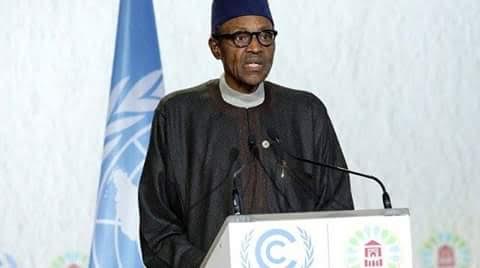President Muhammadu Buhari says climate change has contributed to insecurity in Nigeria especially the north, with special emphasis on the Lake Chad region.
Speaking at 22nd Conference of Parties (COP22) in Morocco, the president said Nigeria is taking urgent steps to combat the adverse effects of climate change in the country.
“We have reflected our determination for green growth in my country’s ambitious Intended Nationally Determined Contribution,” Buhari said.
“We have also announced our plans to reduce emissions by 20% by the year 2030, with the intention of raising this target to 45%, with the support of the international community. This is one of Africa’s most ambitious Intended Nationally Determined Contributions – covering all emissions from all parts of the economy.
“This commitment comes from the recognition of the grave social, economic and environmental threats that climate change poses to humanity. In Nigeria for example, the impact is being felt by more than 2.1 million people displaced by devastating floods that the country has continued to suffer since 2012.
“If not addressed by 2050, the human and financial cost would be colossal. For us in Nigeria, the larger dimension of the challenge goes beyond emission rights. Survival rights are also at stake.”
He said the Lake Chad Basin had shrunk to 10 percent its original size, due to climate change, connecting the effects to insecurity in the north.
“At the 71st Session of the United Nations General Assembly in New York, we were reminded, and we indeed agreed that climate threats and security threats go hand-in-hand. We cannot deal with one without dealing with the other. Both are global problems that demand global solutions.
“The Lake Chad Basin for example, has shrunk to a mere 10% of its original size, and this has seriously affected the livelihood of over 5 million people and contributed in the growth of insecurity in the region, including the emergence of Boko Haram as a terrorist group.
“Hence the urgent need to resuscitate Lake Chad. In this regard, I seize this opportunity to express gratitude and appreciation to those who have responded to our call and to encourage other well meaning partners to join in our efforts to revive the Lake Chad Basin.”
He reiterated Nigeria’s commitment to the Paris Agreement, and the clean up of Ogoni land.
“We welcome the entry into force of the Paris Agreement on 4th November 2016 and hope that the implementation phase would avail all of us a historic opportunity to re-orientate our economies, to build inclusive, sustainable societies that respond to climate change and support Sustainable Development Goals.
“In Nigeria, we are launching a strategic plan for the implementation of our Intended Nationally Determined Contributions and we have equally embraced the issuance of green bonds as an innovative means and alternative way of raising climate finance both locally and internationally. We cannot afford to wait until 2020. We are already making far reaching changes to all sectors of our economy including through:
“Substantially increasing the use of climate smart agriculture, diversification of our energy mix through renewable and efficient gas power, creating a more efficient, cleaner and lower-carbon oil and gas sector especially through a gas to energy programme, initiated the implementation of the clean-up of the Ogoni-Land in the Niger-Delta region.
“We believe that pursuing these programmes will not only reduce emissions and improve climate resilience; but also stimulate growth and economic opportunities in the private sector. Our goal is to make Nigeria one of the world’s best examples of how reducing emissions can benefit the environment and economy.”

 Football1 week ago
Football1 week ago
 Health & Fitness1 day ago
Health & Fitness1 day ago
 Featured5 days ago
Featured5 days ago
 Comments and Issues7 days ago
Comments and Issues7 days ago
 Education6 days ago
Education6 days ago
 Business6 days ago
Business6 days ago
 Business5 days ago
Business5 days ago
 Crime6 days ago
Crime6 days ago

